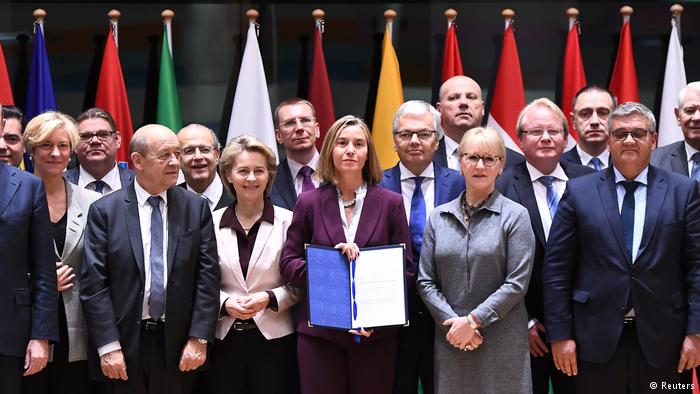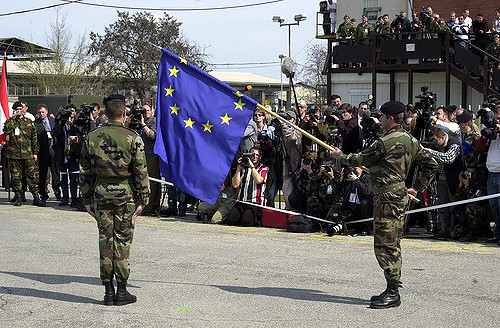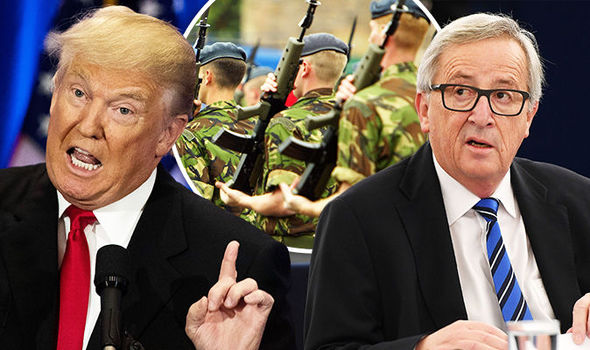Si vis pacem, para bellum
EU’s role as a leader in the region

The launch of the Permanent Structured Cooperation (PESCO) on Defence is the last step of a long process that started decades ago and the first step towards a real integration and cooperation in terms of Defence in the EU at the same time.
The plan for further integration aims to put a stop to the wasting of resources by harmonizing the military capabilities of the member states as well as to provide the continent the ability for a quicker response to a crisis in its sphere of influence. As proven during the Balkan conflicts of the ‘90s, the Libya campaign in 2011, the Crimean annexation of 2014 as well as new forms of digital or indirect warfare, the EU was slow to respond to these crises and had to rely on NATO and, particularly, on the United States.
 This shift in priorities was spearheaded by the Franco-German axis with the support of Italy and Spain. Having secured this initial entente, the member states pushed through this framework. The legal construction was introduced by the Lisbon Treaty, but it was never put in action, despite the fact it has found an almost unanimous support across the continent. The potential for this framework is huge, even though the implementation is very limited at the moment, especially on military interventions.
This shift in priorities was spearheaded by the Franco-German axis with the support of Italy and Spain. Having secured this initial entente, the member states pushed through this framework. The legal construction was introduced by the Lisbon Treaty, but it was never put in action, despite the fact it has found an almost unanimous support across the continent. The potential for this framework is huge, even though the implementation is very limited at the moment, especially on military interventions.
On the industry side however, it created synergies that will enable getting rid of redundancies and repetition in the capabilities of the member states in favor of pan-European projects. On this last point, the battle will be to overcome national interests and protectionism. The focus should be on the excellences of the single member states in order to manufacture products in Europe for Europe, be that a new drone, fighter jet or building digital capabilities.
While this framework will be useful from an economic point of view to expand capabilities, without the need to take away resources from the budget and an economy that is coming back on its feet just now. From a political point of view, it’s instrumental to put the Union in the position to act as a global actor. In fact, since the election of Donald Trump to the White House and the vote for Brexit, the Member States have found renewed strength, a sort of unity in the face of peril. The US has been asking Europe for years to take on their share of responsibility in NATO but were promptly ignored. With the elections of “The Donald”, Europe now feel like it cannot rely unconditionally on the historical ally anymore. Furthermore, following the migration crisis, they also realize the fact that it’s in their interest too to take care of their neighbors’ stability as well.
 This power projecting is, in my opinion, not unique to Europe. The United States is arguably disengaging themselves from the role of World Police and, consequentially, regional actors are picking up the pace. From South-East Asia to Latin America, from Europe to North Africa, regional blocks now have to battle out their influence on their neighborhood and Europe is trying to propose itself as a reliable partner to settle disputes and provide aid. From the Nuclear agreement with Iran, the migration deals with Libya and Turkey up until the recent Jerusalem situation, the member states have not broken ranks and together have, even with all the fragmentations that still exist between them, proposed themselves as the most important actor in the region.
This power projecting is, in my opinion, not unique to Europe. The United States is arguably disengaging themselves from the role of World Police and, consequentially, regional actors are picking up the pace. From South-East Asia to Latin America, from Europe to North Africa, regional blocks now have to battle out their influence on their neighborhood and Europe is trying to propose itself as a reliable partner to settle disputes and provide aid. From the Nuclear agreement with Iran, the migration deals with Libya and Turkey up until the recent Jerusalem situation, the member states have not broken ranks and together have, even with all the fragmentations that still exist between them, proposed themselves as the most important actor in the region.
So from 2018, we can expect an optimistic view on the future. Between the economy rebounding, progress on the monetary and fiscal union side, Brexit negotiation making progress, new trade deals on the horizon, the managing of migration paths secure for now and the ghost of Euroscepticism held off for the moment, the window of opportunity to advance further integration seems to be still open. The PESCO is no doubt a step in the right direction, a chance to be not only an economic giant but a political one too. Yet all could change in the blink of an eye if uncertainty comes again. The clash with the Visegrad Group on refugee relocation, the rule of law in Poland and Hungary, Euroscepticism in Italy, Catalonia’s independence, Germany’s coalition talks, Brexit negotiations taking a bad turn, Russian threats in the East and many other domestic affairs could close the continent on itself, depriving the region and the world of an actor with a positive influence on third countries, particularly regarding democracy, stability, environmental issues, human rights and much more, right when it needed it the most.
